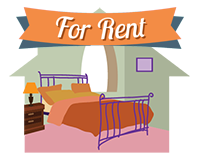As a landlord, you invest time in screening suitable tenants, decide who is best placed to look after your investment property and subsequently enter into a lease agreement. However, with the rise of Airbnb and the sharing economy, you may be unaware of how your property is actually being used. If your tenants sub-let the property without your knowledge or permission, do you have any rights to reclaim possession? Furthermore, what protections does the law offer the landlord? We will examine these issues in light of the 2016 in Swan v Uecker and Greaves [1].
What is Airbnb?
Airbnb is a web platform for listing and renting property for short term stays. Established in 2008, it has boomed in recent years with over 200,000 properties reportedly listed in Australia alone [2].
A problem arises when the tenant benefits from extra income generated by the use of the property, but the uninformed landlord bears all of the risk. For example, the Airbnb tenants may cause damage to the premises, which may not be covered under General Landlord’s Insurance. See this article for more information about the potential pitfalls of Airbnb.
The law and short-stay Airbnb style renting
In Swan v Uecker and Greaves [3], the landlord became aware of the tenant listing of her St Kilda property, without her consent. She subsequently sought to evict the tenants for breach of the lease agreement, arguing that by listing on Airbnb, the tenants were effectively sub-letting the property. The tenants disagreed, arguing that there was no breach of the lease as the listing created a licence to occupy the premises. The fundamental issue was whether the Airbnb agreement established a licence or a sub-letting arrangement.
What is a licence to occupy?
A licence arrangement is where the licensor (tenant) gives the licensee (guest) the right to occupy the property for a specified time. For example, the original tenant may occupy one of the rooms, whilst licensing the use of a spare bedroom.
The Victorian Civil and Administrative Tribunal (VCAT) concluded that the relationship between tenant and Airbnb guests was a licence to occupy and there was no breach of the lease, as the guests had a short-term arrangement, were under strict use terms and the original tenant retained exclusive access by ensuring guests vacated the property.
Sub-letting and the recent Supreme Court decision
In June 2016, the landlord successfully appealed to the Victorian Supreme Court, arguing that the premises were in fact sub-let to the Airbnb guests.
A lease gives the tenant the right to ‘exclusive possession’ of the premises. A tenant is permitted to assign their rights to another party through sub-letting (agreement between the head tenant and a new sub-tenant). However, this is prohibited and can result in eviction, unless the consent of the landlord is received. [4] The Residential Tenancies Act (NSW) specifically states that the landlord can refuse an application to sub-let, even without valid reason [5]. This differs between states, as in Victoria a landlord cannot unreasonably withhold consent [6]. This is why it is it is important to check both your lease and the governing laws!
The Judge concluded that the VCAT decision characterising the relationship as a licence was incorrect and the Airbnb guests were in-fact sub-letting the property. This is because the guests had exclusive possession, occupying the whole 2-bedroom apartment for a specified time.
This is good news for landlords, as it means that listing a property on Airbnb (or similar) without the owner’s consent may constitute a breach of the lease agreement. However, every case will depend on the circumstances and whether the guests occupy the whole premises, or just a portion.
Cashing in on the shared economy – it isn’t all bad!
Airbnb can also offer a unique opportunity for a landlord to generate extra income from either:
- Renting out the property on Airbnb and managing short term guests in a hotel-style sub-letting arrangement (can generate 2-3 times the rent of a long-term tenant); or
- Adding a premium to rental amounts to expressly permit the tenant to sub-lease the property.
It is important to check with your local council first, as unfortunately there is no singular body that governs short term letting arrangements.
What if I don’t want my tenants sub-letting my premises?
Australian residential leases already include standard clauses that prohibit a tenant from sub-letting the premises without the written permission of the Landlord. In addition, there is usually a clause that states something along the lines that a tenant can only use the premises as a private residence and for no other purpose.
You can insert a special condition into your tenancy agreement to prohibit licensing arrangements. This clause would state that the tenant is aware that they are not able to grant a licence to occupy the premises, in any capacity, without express written consent from the landlord.
We’ve provided a sample clause as follows.
“The tenant agrees
-
- to use the Residential Premises only as a private residence and for no other purpose(s), unless otherwise provided for in writing by the Landlord;
- not to grant any licence to occupy all or part of the leased premises or otherwise part with possession without the landlord’s prior written consent.“
It’s always a good idea to check the Residential Tenancies Act in your state before doing so. If you have any questions, give us a call on 0266725904.
What if my tenant has my property on Airbnb without my permission?
- The first step would be to get legal advice as to whether the specific arrangement constitutes a breach of the lease agreement under relevant state laws.
- If there is a breach, issue the tenant a notice to vacate and specify a termination date (usually 14 days after notice).
- If the tenant refuses to comply, you can apply for a possession order from your relevant state civil and administrative tribunal.
As the Airbnb case highlights, the sharing economy can create both challenges and opportunities. However, if you are concerned about the unauthorised listing of your property on Airbnb, consider seeking legal advice to amend your lease agreement.
The NSW government has recently introduced a range of policy measures to respond to the rising popularity of short-term rental booking platforms such as Airbnb.
Among changes to the regulatory framework, a state-wide planning policy will take effect later in 2021. The policy will seek to promote greater consistency across the board by prescribing a range of standard provisions.
A new mandatory Code of Conduct also aims to clarify the rights and obligations of online booking platforms, hosts, letting agents and guests. All parties must comply with the baseline requirements or risk facing serious penalties.
Finally, owners corporations can now adopt by-laws to limit short-term rental accommodation in a particular building or collection of buildings. For further information on these changes, please visit this link – Fair Trading Short Term Rental.
Footnotes
[1] [2016] VSC 313
[2] https://www.airdna.co/covid-19-data-center
[3] [2016] VSC 313
[4] Residential Tenancies Act 2010 (NSW) s 74
[5] Residential Tenancies Act 2010 (NSW) s 75(1)(2)
[6] Residential Tenancies Act 1997 (Vic) s 81
Article Last Reviewed 26 May 2021 by Kirra Griffin
 Kirra Griffin is a final-year law student at Melbourne Law School. As our resident legal assistant, Kirra uses her specialised knowledge of the law to translate complex concepts into easily digestible information.
Kirra Griffin is a final-year law student at Melbourne Law School. As our resident legal assistant, Kirra uses her specialised knowledge of the law to translate complex concepts into easily digestible information.



